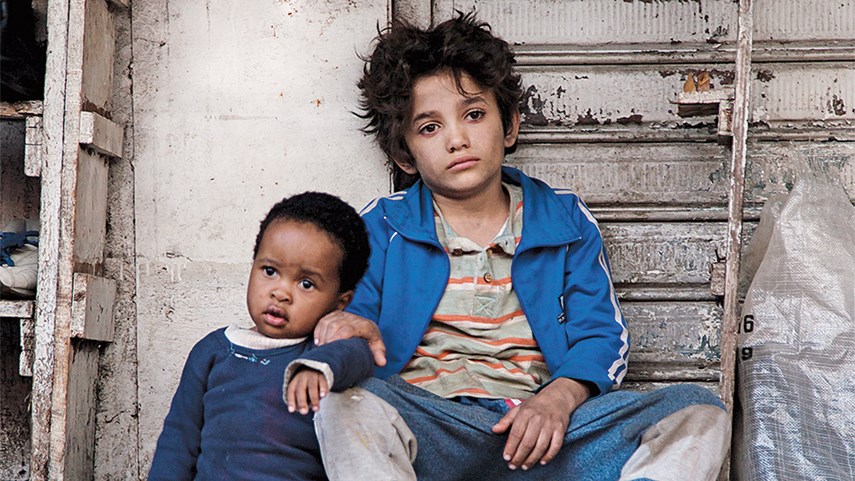Capernaum. Directed by Nadine Labaki. Starring Zain Al Rafeea and Yordanos Shifera. Rating: 8 (out of 10)
You’d be hard pressed to find a more emotionally fraught film than Capernaum, which follows the saga of 12-year-old Zain (Zain Al Rafeea), who receives five years in prison for stabbing the man responsible for the death of his younger sister and then sues his parents for giving birth to him.
This is a film about children in continual peril: children left alone, tied to radiators or wandering into traffic; toddlers playing with cigarettes and machetes; and children subject to the ever-present threat of traffickers. It’s every parent’s nightmare, but it should be a call to action for all people to advocate on behalf of neglected, maltreated and displaced children.
Zain lives in the slums of Beirut with his mother and father (Kawsar Al haddad, Fadi Kamel Yousef) and at least seven siblings (when asked how many brothers and sisters he has, Zain answers “a lot”). He thinks he’s 12, but he looks about seven; no one really knows, since his parents never registered his birth.
His best friend is his sister Sahar (Cedra Izzam). When Sahar gets her first period it’s Zain who tells her what it is, washes her clothing, and most importantly – heartbreakingly – teaches her how to hide it from their parents, who will marry Sahar off to their lecherous landlord now that she has “blossomed.”
Zain is devastated when Sahar leaves and he runs away, heading to an amusement park (after a humourous conversation with “Cockroach-Man”). Hungry and alone, he befriends Ethiopian illegal Rahil (Yordanos Shifera), who cleans the park and stashes her baby Yonas (Boluwatife Treasure Bankole) in the bathroom during working hours.
Enter the most beautiful, natural brotherhood seen onscreen in a long time. Director Nadine Labaki captures so many true-to-life moments between these little untrained actors that you forget this is a feature film and not a documentary. The dialogue and interplay among children is the film’s strongest and most crucial component.
“Kids there, they die of natural causes,” says Maysoun (Farah Hasno), a young Syrian refugee who crosses Zain’s path. They’re talking about Sweden, a far-off Shangri-la that’s “the prettiest.” Maysoun is going to pay a man to take her there by boat. Zain says he’ll go too, as soon as he teaches one-year-old Yonas how to swim.
Then Rahil doesn’t return home and Zain is left with Yonas night and day, with no food and no shelter. A market vendor/visa forger has a standing offer to buy Yonas, ostensibly to place him in a good home. It’s a barter Zain doesn’t want to consider, but the days drag on and food is scarce.
Capernaum won the Jury Prize at Cannes this past spring. Previously, Labaki won the Youth Jury award for her debut feature Caramel, then followed up with a Special Mention at Cannes and the top prize at the Toronto film fest for her film Where Do We Go Now?, Lebanon’s top-grossing Arabic film to date, in which she starred, wrote and directed.
The film is true to the translation of its name, “chaos”, and though Capernaum is packed with an abundance of small and special moments, things feel unstructured and overlong in spots. This may be a result of Labaki’s tactic of placing her actors in scenarios and letting them create their own dialogue, often shifting the direction of the narrative.
The biographies of these non-actors closely mirror the hardships, abuse, and imprisonment encountered by their characters: more than one member of the cast was rounded up by police during shooting. Labaki has worked with the United Nations Refugee Agency to secure new opportunities for several of the film’s participants. The plight of the poor and displaced, and the notion of frontiers, borders – and yes, walls – is front-and-centre in the media right now and faithfully served by this film.



